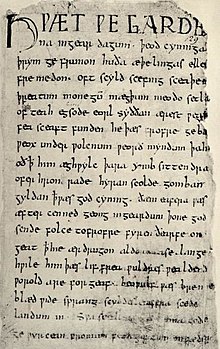Inglés antiguu
| Ænglisc sprǣc | |||||||||||
|---|---|---|---|---|---|---|---|---|---|---|---|
| Faláu en | |||||||||||
| Númberu de falantes | |||||||||||
| |||||||||||
| Datos | |||||||||||
| Familia | Llingües ángliques | ||||||||||
| Sistema d'escritura |
alfabetu llatín, Futhorc y futhark (en) | ||||||||||
| Códigos | |||||||||||
| ISO 639-2 | ang | ||||||||||
| ISO 639-3 | ang | ||||||||||

L'inglés antiguu (tamién llamáu anglosaxón) foi la llingua que se falaba en bona parte de lo que güei ye Inglaterra ente los años 425 y 1125, y de la que remanez l'inglés. Yera una llingua flexiva, con muncha llibertá nel orde de les pallabres, a diferencia del inglés modernu. Asemeyábase a esgaya a otres llingües xermániques, sobremanera col frisón antiguu y el saxón antiguu, porque entá nun fueren anovaes les influencies del francés que, dende'l sieglu XII, fizo'l cambéu del inglés antiguu al inglés mediu. Colos normandos nel poder, l'inglés perdió l'esfotu lo que fizo que se crearen munchos dialeutos.
L'alfabetu tovía emplegaba dellos simbolos rúnicos, magar que la mayor parte de los sos carauteres yeren llatinos.
Queda lliteratura n'anglosaxón, que tuviera gran importancia nel refaimientu d'esti idioma. La obra lliteraria más importante qu'aportó a los nuesos dies ye Beowulf, poema épicu que cuenta les ventures d'esi héroe y que xunta elli mesmu alredor del 10% de tola lliteratura anglosaxona que se conoz.
Unu de los mayores especialistes del sieglu XX nesti idioma foi'l conocíu escritor J.R.R Tolkien.
Exemplu
[editar | editar la fonte]El Padre Nuesu:
| Llinia | Orixinal | Traducción |
|---|---|---|
| [1] | Fæder ure þu þe eart on heofonum, | Our Father, who art in heaven, |
| [2] | Si þin nama gehalgod. | Hallowed be thy name. |
| [3] | To becume þin rice, | Thy kingdom (ric, cf. alemán Reich) come, |
| [4] | gewurþe ðin willa, on eorðan swa swa on heofonum. | Thy will be done, on earth as it is in heaven. |
| [5] | Urne gedæghwamlican hlaf syle us todæg, | Give us this day our daily bread, |
| [6] | and forgyf us ure gyltas, swa swa we forgyfað urum gyltendum. | and forgive us our trespasses, as we forgive those who trespass against us. |
| [7] | And ne gelæd þu us on costnunge, ac alys us of yfele. | And lead us not into temptation, but deliver us from evil. |
| [8] | Soþlice. | Amen. |
Referencies
[editar | editar la fonte]Enllaces esternos
[editar | editar la fonte]Text is available under the CC BY-SA 4.0 license; additional terms may apply.
Images, videos and audio are available under their respective licenses.
